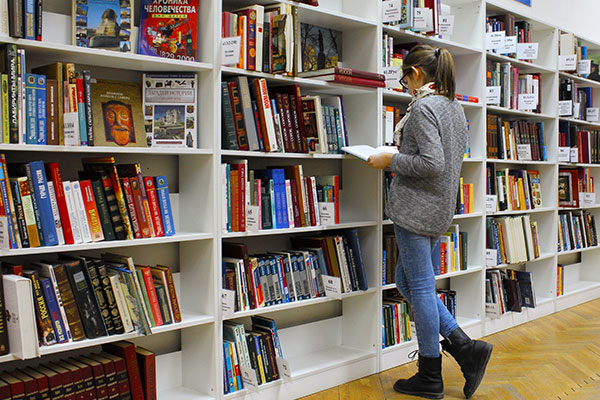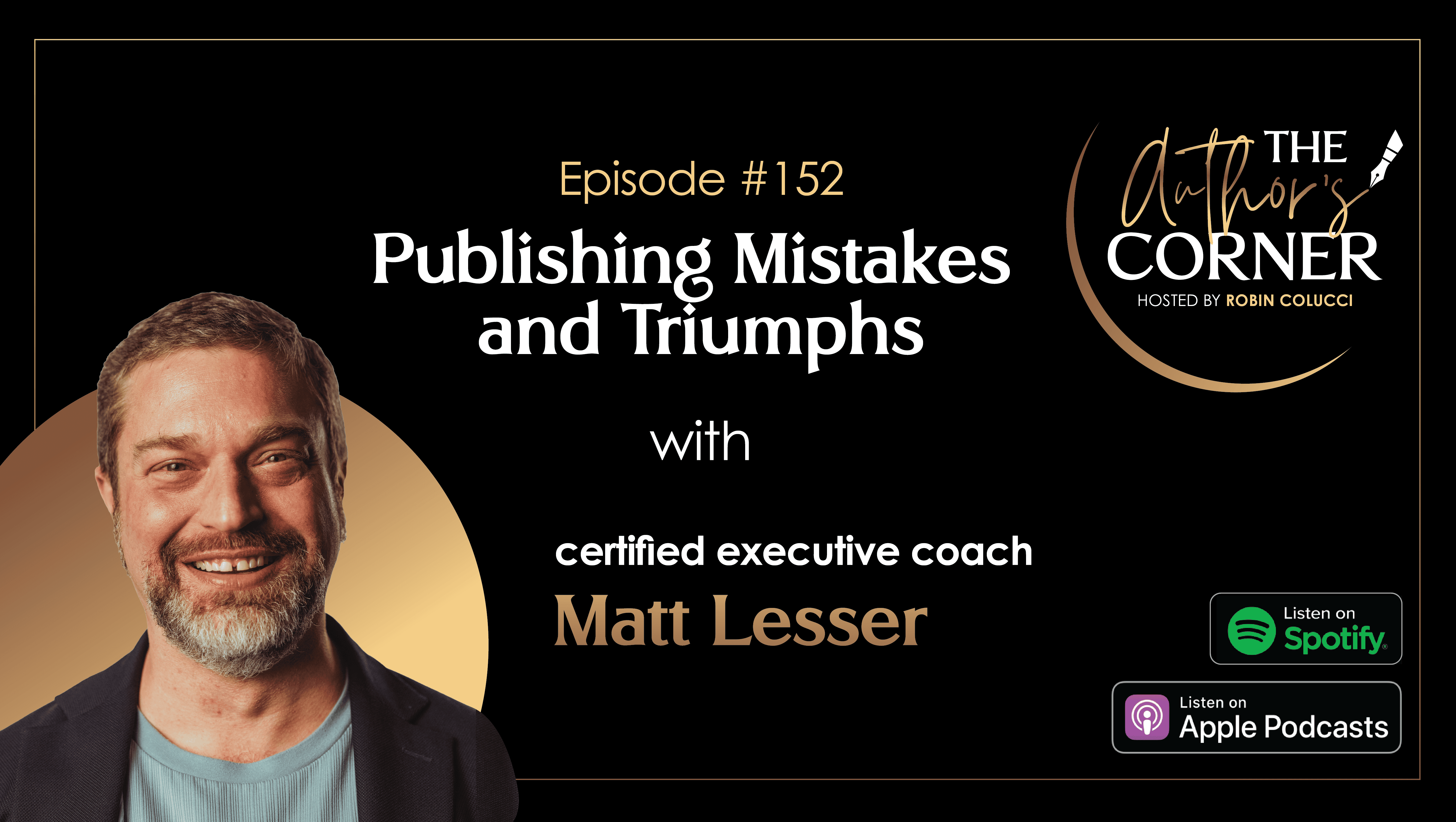
In the final stages of book publishing, the devil is often in the details; the wrong title, subtitle or cover design can be your book’s undoing, no matter how profound your content may be inside. PickFu helps writers get around this problem by doing what is perhaps the best way to learn what makes readers tick – by asking them directly. PickFu does all kinds of market research, but authors have a special place in the company’s success, especially back when it started in 2008. The company’s Chief Marketing Officer, Kim Kohatsu joins Robin Colucci to discuss how authors can use their platform to sharpen their book titles, select the most appealing covers and get feedback from the reading demographic of their choosing. With these details out of the way, you are one step closer to positioning yourself as a thought leader in your space!
—
Watch the episode here:
Listen to the podcast here:
Read the transcript here:
Getting The Final Touches Of Your Book Right With Kim Kohatsu Of PickFu
A lot of times when we are in those final stages of producing a book, we get into this place where we’re trying to figure out, do we have the best title for this book? What is the best cover design? How are we going to figure this out? How do we test it? How do we find out what people are going to buy? Through my membership in the Forbes Business Council, I came across a fellow member, Kim Kohatsu, who’s the Chief Marketing Officer at PickFu. PickFu is an online service that authors and publishers use to test and figure out what sells before they sell it.
With many years in advertising and marketing, Kim knows how to appeal to readers in her role as a chief marketing officer for PickFu. Inside of that role, she helps writers who are soon to be authors use PickFu to hone in their book titles and select the most appealing covers as well as getting feedback on how to position themselves effectively as thought leaders. Let’s get our conversation going with Kim so we can find out more about how this works and how we all can capitalize on it.
—
Welcome, Kim. I am happy to have you here with us.
Thank you. It’s great to be here.
One of the things I love doing is sharing with authors the resources that they might not be aware of. I am so intrigued by what you were sharing with me about PickFu, the kinds of things that you can do, and how authors have utilized your services in the past and continue to do so. Why don’t you tell me a little bit about what PickFu is? A little bit of steering it towards authors and what could be useful for authors?
PickFu is an online service where companies big and small do all kinds of market research. The company was founded back in 2008 and authors were one of the first customer segments that discovered the usefulness of the product. There were some influential authors who write about the publishing process that stumbled upon PickFu and began to see how it’s useful to hone in on the marketing aspects of a book launch. Things like your book title, cover design, blurb and even your author bio. How do you sell a book? We’ve always found that the best way to do that is before you launch or go into a publication, ask readers what they want and prefer.
The best way to sell a book is to ask readers what they want before launching anything.
What our service does is it helps you to quickly connect with 50, 100 and even up to 500 people at a time and test your options. If you’ve got a couple of titles, subtitles, or book cover designs that you’re considering, you can upload those at PickFu.com. You can choose the kinds of people that you want to weigh in. Maybe that’s women, people of a certain age, college graduates or any number of things. It could be heavy readers or people that prefer eBooks or audiobooks. We’ve got all kinds of audiences built-in and then you hit publish. In a matter of minutes, people will start to weigh in and they’ll not only vote on which option they like, but they’ll write a comment as to why they voted the way that they did.
What happens when you aggregate these comments is you get valuable insights as to what is working and what isn’t. That helps you with everything. If you understand what’s working about your title, that’s going to influence your description and it’s going to influence other parts of how you market the book. It’s been a valuable tool for authors. It was one of the early segments that discovered PickFu, it’s one that we focused on and we’ve tried to deliver value for authors. Over the years, we’ve added audiences, features and all kinds of things, specifically geared for authors because they were one of our earliest customer segments.

When you’re asking the audiences what they like, is it framed in terms of what’s most attractive to them? Is it framed in terms of which book would you buy?
The nice thing about PickFu is you can write your own question. We do have suggested prompts because some people do get hung up like, “I don’t know how to frame this.” What a lot of people do is they say, “Which would you rather read? Which would you rather buy?” Sometimes you give a little bit of background, “It’s a book about X, Y or Z, which one would you pick up?” It depends on what you’re going for. You want the things to speak for themselves, especially when you’ve got a book description or a cover. It’s going to live out there by itself. You’re not going to be there to explain it. A lot of times I always say, “Keep your question plain and try to be as objective as possible because you want whatever it is you’re testing to do the work for you.”
One of the big tests of a good title and a subtitle should tell the reader exactly what it’s about and what they’d get out of reading it. If you have to explain what it’s about, that’s probably your answer.
When you’re working on a manuscript, you’re so close to it and it’s hard to be objective. What’s valuable is when you go out to people who don’t have that same proximity to the project, it helps you get out of your own head.
You said you work a lot with self-published authors but this could also apply to traditionally published authors.
We have a great case study on our website about this author named Albert Podell. He wrote a travel log. He had been to every country in the world. He wrote a book about it and he was in a disagreement with his publisher about the book cover because he felt strongly that the cover he preferred was the way to go. To prove that his publisher is wrong, he brought it to PickFu. That book went on to become a New York Times bestseller. It proves that you have to give the people what they want.
I have to ask you, was he or his publisher right?
His publisher was right.
I was speaking where this idea came up about creative control and self-publishing. I said, “Creative control isn’t always the best thing for a self-publisher.” One of the great things that a traditional house can do is to have that understanding of what a book cover sells. With PickFu, you could have that check and balance of checking your own taste against what the market recognizes as a professional-looking cover in a company.
It’s worked on the self-publishing side too. I remember a story of an author who was writing a medical book and he had a book cover that he was sure was the best. What happens is it surfaces things that you don’t even think about. His book cover had a bunch of doctors in surgical masks and what he didn’t realize was people find that scary. It’s very intimidating and you don’t necessarily look at doctors whose faces you can’t see. That was something that he hadn’t even considered. Bringing those things to light is important. If you are self-publishing, doing that especially before you launch. Before you put it out for sale, have those things locked down and in good shape because you can’t take it back. You can shift your assets over time, but the Kindle bookstore isn’t going to forget that you didn’t launch well. It will hold those things against you.
In the traditional space, I can think of some key times, even with the agent where you’re going back and forth on the title that you want to present to publishers. The agent has their opinion. Sometimes it’s the same. Sometimes the client likes the agent’s ideas and sometimes they don’t. Usually, they come to some consensus but wouldn’t it be great to have this other third-party resource where you could take it to the people? One of the things that are interesting about what you’re offering in PickFu is that you’ve got these audiences segmented. How do you get people to raise their hands for this? Are they people who have enormous amounts of time on their hands?
We have about 10,000 ready to survey respondents. It differs. For some people, this is a side gig and for some people, they spend quite a bit of time. What is important is that our survey respondents opt-in to your poll. On the web, what happens is there’s something called content-blocking where you have to go through this thing in order to keep playing a game or to continue reading an article. People aren’t motivated to do a good job. They’re trying to get to what they were doing before. We don’t do that. Our survey respondents are paid and we’ve got a lot of quality controls for vetting.
We’ve got a combination of machine learning controls as well as human controls to make sure that people take these polls seriously. As part of our interview process when people come to the PickFu panels, we learn about their habits. We learn things like what’s the highest level of education they attained? What products do you buy? What behaviors are you involved in? What’s important to you? That helped us offer not only speed but also quality. You can come to PickFu depending on the audience segment you choose, your poll could be finished with 50 responses within half an hour. It’s fast and you get this feedback quickly.
As we’ve grown and continued to improve the product is depending on your subject matter, you can get targeted as far as what readership you’re going for. We’ve got a lot of things around reading habits, but we’ve also got segments like avid home cooks. If you’re writing a cookbook. We’ve got people that travel quite frequently. If you’re writing a travel book, that could be a great segment. We’ve got vegetarianism, hiking, and people that use a lot of body care products if you’re writing about self-care. There are a lot of ways it can go and you can mix and match the traits that you use. If you want women who are college graduates of a certain age, you can do that. There are a lot of ways that you can go about building that audience.

A cool aspect of it is that you can target it. One of the first things people should do before they write a book is to figure out who it’s for. They don’t always do that when they’re on their own, but that would be a good goal. You should know early on in the process which audience segments to go after in terms of getting that feedback. That was another interesting thing is how quickly the turnaround is.
It’s a first come, first serve process. If you qualify for the poll, let’s say you meet all the targeting parameters, as a panelist, you are incentivized to respond quickly. That’s how we’ve managed to deliver that speed.
Is it primarily titles and book covers? Are there other kinds of questions that authors are looking for answers to?
It is primarily titles and covers. Those are such critical aspects of your book marketing, but it can be other things too. We have an interesting case study where the L. Ron Hubbard book, Battlefield Earth, this author was tasked by the publisher to rewrite the book description. We’ve got a story up on our blog about his process for going through that. He did all this research and he came up with a few drafts. What he did was he took his draft and then the old publisher’s draft that he was tasked with updating and put it to the PickFu panel and saw what happened.
Some people in the panel were familiar with the book. The important thing to remember is you’re not writing a book report. It’s to sell this book. It’s not to describe the book and tell the plot. It’s to tell you why you want to read it. Those sorts of things are important. Book blurbs are another interesting thing, but there have been other kinds of interesting questions too. Even character names or which bio makes me sound more authoritative are also good to see because that’s part of how you market your book too.
There’s got to be some limit on the length of what you would send them. For example, an author bio on the back of a book jacket is shorter than the about the author, which is usually inside the book. Do you have parameters on limits?
Focusing on speed, these polls are meant to be completed fairly quickly. When it comes to text input, we do have a character limit. I believe it’s 2,000 characters. You could get around that. You could upload an image of the author if you wanted to. There is quality control. If there’s anything that seems abusive or takes too long, those things can be flagged by our system. You can go up to 2,000 characters and that’ll get you a substantial amount of text.
That’s enough for a blurb on the back of a book.
There are all of these stories. The Great Gatsby had these horrific other titles that F. Scott Fitzgerald was thinking about. Nobody’s immune to this. You can be a fantastic published credible author and still get blinders.
I heard that Napoleon Hill’s working title for Think and Grow Rich was something like, “Use Your Noodle and Get the Boodle.”
It might be a myth, but it’s plausible enough to be true.
He has over 70 million books sold. He’s been gone a while ago.
It’s the same thing with The 4-Hour Workweek, Tim Ferriss’ book. There were all kinds of crazy titles that wouldn’t have resonated, memorable and wouldn’t do what a title needs to do.

One of the things that are valuable about what you all are offering and why I got excited about sharing you and PickFu with my readers is that often authors, especially when they’re in the self-publishing space, not because they’re any less than, but in order to get a book deal, you have already gotten past this space. Self-published authors don’t have that hurdle of getting the agent and getting the book deal. A lot of times they miss this, which is understanding that you need to write a book from the point of view of what is going to be interesting and exciting to your reader. It’s not always the same as what is interesting and exciting to you.
Telling the story of how you became successful is maybe interesting if you are writing shoe dog to a broad audience, but it’s not necessarily interesting to people if you’re not an internationally well-known figure. You could tell all the same stories in the context of something that addresses a problem that your ideal reader is already aware that they have. What you’re doing is helping people get out of what looks interesting through their eyes. I’m a doctor. If I saw a book with doctors with surgical masks on the cover, I would want to pick that up because that’s fascinating to me versus what is the reader looking for.
You have to remember, you’re not writing this for you. You want to sell it. You want other people that don’t know who you are that have all the choices in the world. You want them to pick up your book. That’s the thing that’s important. If you’re writing for you, keep a journal. If you’re trying to sell a book, you have to sell it to the public and you have to be appealing to what the tastes are out there.
If you’re writing a book for self-expression, that’s why they have journals. Because you have these built-in audiences, you’re able to offer these services at a reasonable price. People can go to PickFu.com and see your pricing. Can you say a little bit more about how you all fought through that?
It changed over the years. It’s a price per respondent. The minimum respondent poll is 50 people. The base price is a dollar per respondent. At a minimum, you’re paying about $50. As you add features to your poll or you add targeting to your audiences, that price goes up incrementally but it’s all dependent on what your needs are. We have a pricing calculator that you can go and you can price out the poll that you’re thinking about running. If you go to PickFu.com/pricing, you can play around with the tool and see, “If I were to pull 100 people versus 50 people or if I were to do this audience versus that audience, what would that cost me?” You can run a poll for $50, $60, or less than $100. It depends on what the targeting is and how many people you’re looking to poll.
You also talked about you could build your own audience. Can you give me an example of when that might be a good move?
It comes down to who your book is for. As an example, if you were writing a dating book for women, you would want a female and unmarried. That’s two traits that you would combine. You can combine up to four. We’ve got travel habits and it’s your travel frequency plus your income if it’s for jet setters who stay in four-star hotels. It depends on who your book is for and who you’re looking to target. You could do a general audience, which is no targeting. It’s the first 50 or 100 people and depending on what you’re going for, sometimes that’s valuable.
If you are looking to zoom in on a certain segment, then you can play around with that. One of the things that we offer is reading habits. Perhaps, you want to mix the intended readership of your audience with how they like to get their books. If you’re trying to appeal to audiobook listeners versus eBook readers, that’s another way you could potentially build your audience that way. We’ve got targeting where it’s like reads at least 1 or 2 books a month. If you think your book is going to appeal to people that read a lot or maybe that don’t read much, it can run the gamut based on what you’re working on.
I could see some real value in wanting to know the opinion of people who read because you’re dealing with a buyer because people who don’t read, don’t read.
They’re not motivated to buy a bunch of books.
With four traits, you could get some good targeting. Have you seen situations where people need more? What does that look like?
We’ve had a lot of eCommerce sellers that use our service. That tends to be targeted because they’re physical products. PickFu has been around long enough that if, for example, there’s an audience that we don’t offer, you can email us and say, “Have you ever thought about this?” If we’re able to meet a certain quality threshold that meets our speed, quantity and things, we’ll offer it. We can start to try to build that audience. We had a financial services company come to us and they were interested in targeting people of a certain credit score. We were like, “We could probably build that.” It took us a little while, but we’re able to address those things. If you were to write a book about financial health and tips for saving, you could target people based on their credit score. It’s a range. It’s not an actual score but it’s great because we’re a small enough company that you can approach us. Somebody will always read your email and respond. If we’re able to deliver that, we will.
I could see how you build it and people can use it over and over again. It sounds like the people that are responding to these surveys aren’t necessarily sitting at home with nothing else to do. From a little bit of what you’ve shared about education and income level, would you say that this is something you can tap into? I’m thinking about a business book. We met through the Forbes Business Council so we deal with business people all the time. Do you find that there are people responding to those surveys who might be more of a B2B dynamic?
We have been able to cultivate an audience that is motivated to help. People like that their opinions are helping other business owners or entrepreneurs. We’ve got a page on our site that interviews some panelists and one guy has an MBA. He’s like, “I like doing it.” People’s motivations are different. Some people maybe have a desk job and it’s something that they do while they sit at their desk or maybe they’re at home and they need to make a little side money. It spans the gamut, but you will find if it is a B2B audience that you’re looking for, you can find college graduates and full-time employees. That’s another segment we offer. You can also target by income levels. If you wanted to do $60,000 and up, that’s available to you. There are a lot of different people that you can reach with PickFu.
Did you have a poll that stands out that was strange or surprising, book or not book-related?
PickFu was born because we have two cofounders who are both software engineers. One of them is color blind. When it came to creative choices because there were two of them, sometimes they would come at loggerheads. They built it for themselves to break the tie between the two of them. Coming from that background, we’ve seen a lot of interesting polls, but it’s funny how many applications there can be.
We’ve had people come to PickFu and decide on their dating profile picture. You ask a group of women, “Which photo makes me look most attractive,” because you’re selling yourself. Our Cofounder, John, when his wife was pregnant, he was concerned about some of the names that they were considering and his poll was like, “Pretend you are a schoolyard bully. How would you make fun of this name?” He had 50 people go at it. It’s like, “What could you possibly throw at this name?”
If you’re writing for yourself, keep a journal. If you’re trying to sell a book, you have to be appealing to what the tastes are out there.
I want to be in the survey. I want to answer those kinds of questions.
There have been some memorable ones. We run polls for our own benefit. I run the PickFu blog. A lot of times we survey respondents for content for our blog. For Mother’s Day, we did one where it was like, “What’s the worst Mother’s Day gift you’ve ever either gotten, heard of, or received?” We had some great answers. For Valentine’s Day, we had people tell us their engagement stories, some of them were funny and some of them were romantic. Those human interest ones are the funniest.
I love that it was created to break a tie. That would be the last thing I would think of, “Let’s build some software.”
That’s the last thing I would have done, but if you knew Justin and John, our Cofounders, you would say, “Yes, that’s exactly what you would do.”
The bullying thing is a real thing. PickFu didn’t exist when I had my kids, but I remember thinking what would be the potential teasing. I chose some names that were teased-proof. Is there anything else that you would like to share that I didn’t ask that you think our readers need to know?
I think we’ve covered it, but if anybody out there reading wants a demo or wants to get in touch, go to our website. Use our chat function or email us at Info@PickFu.com and we’ll answer your questions. We can help set you up for success.
I can’t wait to use it. Kim, thank you for coming on and sharing with us about this amazing resource.
I enjoyed it. Thanks for having me.
You’re welcome. It’s a pleasure.
Important Links:
About Kim Kohatsu
 Kim is a lifelong lover of words and the chief marketing officer at PickFu. She has brought her energy for writing, branding, and the Oxford comma since she began working with PickFu’s co-founders in 2012. Kim earned her B.S. in advertising, political science, and French from Syracuse University and her M.S. in communications from the Adcenter (now Brandcenter) at Virginia Commonwealth University. Kim lives with her dog Teddy in Los Angeles, where she’s probably thinking about lunch.
Kim is a lifelong lover of words and the chief marketing officer at PickFu. She has brought her energy for writing, branding, and the Oxford comma since she began working with PickFu’s co-founders in 2012. Kim earned her B.S. in advertising, political science, and French from Syracuse University and her M.S. in communications from the Adcenter (now Brandcenter) at Virginia Commonwealth University. Kim lives with her dog Teddy in Los Angeles, where she’s probably thinking about lunch.




